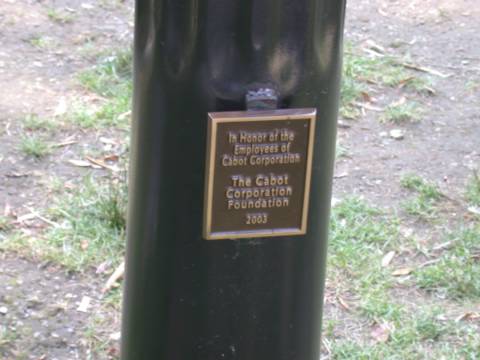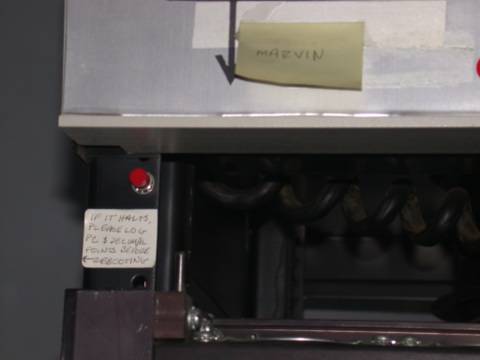Tuesday, September 28, 2004
Give and Ye Shall Receive
MPAA Chafes at Bit(Torrent)
A new technology called BitTorrent, which can download a pirated feature film in DVD quality in less time than it takes to watch, is posing a new threat to movie studios. According to Mercury News, the technology, which requires several "owners" of a particular film to "share" individual parts of it with others, is particularly tough for the studios to battle since the sharing network shuts down after the film is downloaded. The BitTorrent software was created by Bram Cohen of Seattle, who receives no money from sales of pirated films but does welcome "donations" from visitors to his website. However, that may not insulate him from a lawsuit by the MPAA. John G. Malcolm, director of worldwide anti-piracy for the Motion Picture Association of America, told Mercury News: "BitTorrent and others who are complicit in copyright theft should take little comfort from their temporary celebrity status."
The level of asshattery is unbelievable. I have no idea what the MPAA thinks they're doing, but shame on the IMDB and Mercury News for letting themselves be spoon fed propaganda like that. This article frames BitTorrent as a movie-stealing tool and insinuates that Bram Cohen is asking for donations from movie pirates.
In reality, what Bram Cohen has done is come up with a way to make file distribution much cheaper and more efficient by making better use of bandwidth. In conventional downloading, a server sits on the internet, and each person who asks for a file is sent an entire copy from the server. As more people ask for files, the server has to blindly send more and more complete copies of the file, making it slower and slower (and in the extreme, bringing down the server).
Cohen's observation is that as users download the file, they have more and more of the file, and yet their upstream bandwidth is sitting there idle. Why not use some of that upstream bandwidth to send the parts of the file that users have to other users? Then the central server doesn't have to send out so many copies of the file in order to serve everyone. The main site has some great charts to illustrate this idea. This winds up drastically reducing the central server's bandwidth usage, yet everyone still gets their file. And since everyone is getting the file from many sources simultaneously, they get the file faster. In fact, as more people download the file, everyone's download gets faster and not slower. All they have to do is contribute a small amount to the distribution. What Bram Cohen has done is create a miracle--faster, more available downloads for the users, using less bandwidth for the distributor--simply by reorganizing poorly utilized resources.
Of course this sort of thing is probably going to piss someone off. I'm just surprised it's the MPAA. There is no doubt that BitTorrent is used to pirate movies, but it's not well-suited to illegal activity. For one thing, you might have noticed in the sentence above that it relies on a central server to coordinate the network. That is the key blunder that brought Napster down. What is distributed by the central server is entirely up to the person who runs the server, so if there are illegal files being downloaded from your BitTorrent server, it's a piece of cake to find you, and it's a piece of cake to prove that you put them there. People who set up piracy torrents are probably relying on the relative obscurity of BitTorrent. The MPAA might be aiming this PR push at those people, but threatening Bram Cohen is unconscionable.
This is not some guy setting up an offshore shell corporation or operating out of contested territory like other P2P software providers. Nor is it some anonymous author trying to cause mischief. The program isn't designed to make it hard to track down its users. If he wants a donation, it's because using BitTorrent can save a company thousands of dollars in bandwidth costs when they release a big file. For example, it has become commonplace for game companies to release the hotly demanded (and gigantic) demos for their games as torrents. In fact, I got the recent Warhammer 40,000: Dawn of War demo in this way, sustaining a download rate near my connection's top transfer speed, and without having to wait a single second for the download to start. The MPAA should be thanking this guy for inventing something that can make their future movie download services cheap and convenient to their customers (and then only asking for voluntary donations), not threatening to sue him.
Arnold Kling on Health Insurance
One of the most serious impediments to rational debate on health care is the misuse of the term "health insurance." What we call health "insurance" in this country was never designed to insure the consumer. Instead, its purpose is to insure steady, reliable incomes for health care providers. True health insurance is the economist's equivalent of a unicorn -- we can describe it, but none of us has actually seen it.
What Blue Cross and Blue Shield pioneered was a "split-the-check" approach to health care. An equivalent plan for restaurant meals would be that instead of paying for your meal, you would pay an annual premium to "Blue Eats," which would in turn reimburse restaurants for their costs, plus a profit margin. Every individual member of "Blue Eats" would have an incentive to eat out a lot and order the most expensive items on the menu, because the cost is shared among all of the members of "Blue
Eats.""Blue Eats" would be a great marketing ploy by restaurants, because it would get people to eat out more and spend more at restaurants. Similarly, John C. Goodman argues that what we call "health insurance" originated as a marketing ploy by physicians and hospitals. It worked really well, too.
Here's the article he references by John C. Goodman, too. Some interesting detail there.
Monday, September 27, 2004
Substitution
Two goods are substitutes if one can be used more or less in place of the other, at least for some uses. Some common textbook examples of this are margarine and butter, chicken and steak, movies and video rentals, and CDs and cassettes. In some cases, consumers might strictly prefer one or the other, but more commonly, people prefer to consume some combination of substitute goods. Stated differently, it would take a lot of just one good in order to make you as happy as when you're consuming some combination of the goods. This makes sense; most people split their entertainment budget between videos and movies, and if they couldn't watch movies, you'd have to give them a lot more video rentals to make them as happy as they would have been before.
If you want to define a consumer's utility function on the two goods, you could write it as a function of the amount of two goods consumed, say U(x,y). In this case, there are two goods, X and Y, and U is some function of those two. Now, U can take many functional forms, and the forms it takes says a lot about the two goods X and Y. For example, it might be that the two goods are not substitutes, but are in fact compliments. Complimentary goods are goods that we only care to consume together; the textbook example of this is left shoes and right shoes. Consuming a thousand left shoes and four right shoes makes you exactly as happy as four left shoes and four right shoes (assuming you have two feet).
The greater U(x,y) is, the greater utility the consumer is experiencing from X and Y. For most goods, the greater x and y are, the greater U will be (but again, this is not necessarily the case; it's not hard to think of "bads," which make you less happy the more you consume). The problem for a consumer is that they have a constraint: a limited amount of money. So the problem is to maximize utility within the budget constraint. Consumers are probably pretty good at this, since they know what their preferences are, even if they don't think about the problem in this way.
So what happens if one of the two goods becomes more expensive? If the goods are close substitutes, then the consumer can substitute the other good for the one that is increasing in price. If the price of steak goes up, you might eat chicken more often; if movies get more expensive, you might rent more often and wait for marginal movies to come out on DVD.
So here's what I really wanted to talk about: oil. The financial markets are once again very concerned about rising oil prices, and with good reason. I have yet to be convinced that we're at "peak oil" or anything like that, but there are other factors. The rest of the world is rapidly industrializing. China's economy has been growing at a breakneck pace, and so has their demand for oil. This year, China replaced Japan as the world's #2 oil consumer, and there doesn't seem to be much that's going to stop this over the long term, as their year-on-year increase in oil usage drawfs that of the United States. And it's a good thing, really, that the standard of living of people in China is increasing.
However, there's almost no scenario in which this doesn't result in higher oil prices for the rest of the world. We're not talking about an oil shock like in the 70s, when OPEC decided to produce drastically less oil. We're talking about a longer-term change in the market for oil, where more countries are trying to buy more oil. OPEC might increase output, but probably not by enough to offset this effect (of course).
So Americans' gas prices are going to increase over the long term. In the past, this meant we were basically screwed, as there's no close substitute for gasoline for our cars. However, now there is an increasingly viable substitute for oil: the accumulated technological knowledge that goes into the production of gasoline-electric hybrid engines. Right now we consume very, very little of that, but as oil becomes more expensive, consumers will increasingly lean on the capital that goes into high-efficiency engines in order to stay as close to neutral in utility as they can.
So if you're looking for a potential future growth industry, look at companies and technologies that will benefit from this, and invest in them. Or if you think you can do better, invest yourself in research that might improve the state of the art so you can make millions of dollars.
The Price of Freedom
Obviously, this is a ridiculous way to look at it when the Mac is a much better machine. When you compare a Mac with a similarly equipped PC, you might well find that the Mac is cheaper than the PC. To be economically rigorous, we could run a hedonic regression to find a quality-adjusted price index. That is, we could run a regression that attempts to explain the price by the quantities of the characteristics of those goods (ie, amount of RAM, hard disk, processor speed, etc). Then you could estimate the effect of each of those components on price; the residuals (ie, the variation in price that isn't explained by the quality variables) would tell you what is happening to the quality-adjusted price level, which is what we're interested in.
I think that'd be a fun thing to do if I didn't have to find and enter the data, but I'm sure such geekiness isn't really necessary, and don't see any reason to doubt what they're saying. Apple has been making a conscious effort for many years now to make their models more affordable, though they still want to keep a higher average quality level. If it has borne fruit, it's unsurprising.
In any case, I think there's something that they're leaving out of their calculations, which is the value in the software available for PCs that isn't available for Macs. I'm not talking about the price of the software itself, I'm talking about the value of having the increased choice in software available. The PC has a much bigger software ecosystem available for you to play with, and probably has more suppliers for any given piece of software. This gives consumers more variety, because they can choose from more pieces of software, and thus they are more likely to find one that works exactly like they want. It gives consumers more flexibility, in case one supplier goes out of business or something happens that inconveniences them. It also gives consumers more market power in the software market, since they might find increased competition in the particular piece of software they want, and that will translate into lower prices. All of these things have value for consumers, and it makes sense that they would pay for them.
Of course, consumers are all different, and all of these factors might well be unimportant for a large number of users. This is almost certainly the case, and I imagine you do find a lot of these consumers on Macs. For example, a given consumer might be uninterested in purchasing third-party software, and want a computer primarily for the software it comes with. Apple probably has an advantage to this consumer. Or, a given customer might well want software where the market leader happens to write their software for Macs, which is undoubtedly the case for many media applications. Since it's so hard to nourish a software ecosystem, especially when you're not a market leader, Apple has wisely been investing in cultivating such applications.
Whether you realize it or not, you probably are comfortable paying for flexibility like this. For example, few people accept a mortgages that they can't prepay, even though they're at a lower interest rate. It only makes sense that PC manufacturers would be able to extract some of this benefit from you. They probably don't extract all of it, though, which means that Macs are only cheaper if you're not adjusting for this.
Long-term, there might be good news for Apple here. I actually used to use a computer, and be highly entertained by it long before I had any sort of access to the internet. Today, I consider a computer without internet access largely useless. The most interesting things to do with a computer have shifted to activities that are based on standard protocols that don't require you to be on any one platform, like email and web-based applications. If the trend continues, then Apple (and others) should have an easier and easier time getting customers. (Of course, Microsoft doesn't want that to happen, and they have a strategy for attempting to slow that down. It makes you wonder, what is Apple's strategy for .Net?)
Still Glad I Use Firefox
I think this is all a great idea. Microsoft has the biggest ad budget in the world, but publicity is much more valuable and much harder to get. And they've managed to get plenty of publicity in the past few weeks, even in print media. Several big sites have reported a growing number of Mozilla Firefox users in recent months; W3Schools.com has reported that nearly a sixth of their users are using Mozilla browser, and the more mainstream News.com reports that in September, nearly 20% of their visitors were using Mozilla browsers, up from 8% at the beginning of the year.
Of course, Charles Manski would point out that this is only meaningful if you believe that the people who browse those sites have the same distribution of browser usage as people in general. I don't believe that, but there are two possible responses to this. The first is that even though the average user won't go to W3Schools.com or News.com, IT professionals and web developers probably do, and so it is a good sign the readership of those sites is increasingly using Firefox. They probably are sympathetic to making the websites they develop or the corporate intranets they administer friendly to Firefox (My employer plans to role it out shortly). The second response is that a web research firm has reported that Mozilla's usage share has been increasing while IE has been suffering its first declines ever:
Mainstream users have not shown the same gung-ho enthusiasm for the non-Microsoft browser but have increasingly adopted Firefox, according to Web analytics firm WebSideStory. The percentage of visitors to e-commerce and corporate sites that used Firefox or another Mozilla browser grew to 5.2 percent in September, from 3.5 percent in June 2004. Meanwhile, Microsoft's share of the users shrank from 95.5 percent in June to 93.7 percent in September, according to the company.
It sounds pathetic, but it is major news for a volunteer-led project like Firefox to make such a big dent in market share so quickly, against the incredible market and distribution power of Microsoft. Furthermore, it's not clear that Microsoft has any credible response to the factors that seem to be driving people towards Mozilla. We can't really be sure what those are, but I would say the main factors are probably security fears and an increasingly inconvenient browsing experience when using IE.
When Microsoft announced their major security initiative over a year ago, I actually thought they would make some progress. Most people understand that this is a strength of open source software, and taking that away would definitely benefit Microsoft. They even closed the company down for a month so that all their programmers could go through and harden their code. However, nearly two years later, it's hard to see any improvement in the situation. Microsoft recently released Service Pack 2 for Windows XP, which contained many fixes, but it's not clear that enough people are downloading it, given the hassle that it is, and it was already outdated before it was released. Their credibility on security is even thinner now that they've made such a big deal about getting tough.
More important might be the browsing experience. The version of IE in Service Pack 2 does contain popup blocking, but I imagine most users probably won't get a version of IE that does this until they move to Windows Longhorn in a year or two. Microsoft has declined to continue development on IE as a standalone program, requiring users to buy new versions of Windows to get any updates to it. That's just not a realistic strategy in this game, given how incredibly quickly their competitors can move. Firefox is a small, free download and makes popup ads go away right now. In the past few weeks, a growing numbers of sites, including the New York Times and Slate, are popping up ads that take up the entire screen. As that annoyance factor increases, the one-time investment in effort required to get Firefox probably looks more and more like a good deal to people. Again, until Microsoft shows that they can move quickly and add the innovative features that make people love Firefox once they try it, this is going to remain a problem for them.
I've often said that in order for Microsoft to lose their power here, they don't need to stop being the dominant web browser. What percentage of customers do you think eBay or Amazon is comfortable with turning away, or providing a substandard experience for? One in 20? One in 10? With the increasing amount of strange software that installs itself silently through IE, or hijacks people's home pages, it becomes increasingly hard for sites to tell their users to just use IE. If sites are finding it important to work with other browsers, Microsoft can't tell the web what to do as easily.
In fact, one of the SpreadFirefox guys recently put up a site, Defending the Fox. The idea is to collect a list of sites that don't work on Firefox; I looked at the entire list and it was notable to me for the absence of any sites I visit (OK, I could see myself needing to use verizonwireless.net, but I happen to use T-Mobile). The site is fine, but really, I wouldn't bother. As I've said before, I've used Firefox for several years now without any major inconveniences (I do take advantage of its privacy settings to deny third-party cookies (not the default setting), which makes Hotmail not work, but that's their own damn fault: Gmail and every other web mail or login-based service I use seems to get by without them). The list is basically an advertisement for how compatible Firefox is with the web as it exists today. It seems almost everyone has taken the miniscule amount of effort required to make sure their site is largely standards-compliant and works with all the major browsers.
Coming back to the incredible publicity push by SpreadFirefox.com, they've had a great couple of weeks. Their campaign to get 1 million downloads of their preview release in ten days wound up with their getting 2 million downloads in the same period. I think this was a bit of a conservative goal; they said several months ago that their daily download rate had risen to 150,000 to 200,000 a day in response to the increased worm attacks of the past year. Still, carefully managing that campaign gave them another publicity punch after the campaign ended. Notably, their top 100 bloggers were specifically responsible for 100,000 referrals in that period.
It is hard to know what the long-term trend will be. It's not clear whether they'll be able to sustain this rate of interest or not. Nonetheless, the underlying factors that seem to be sparking such interest in Firefox, aside from their PR push, seem likely to stick around for another year or two.
Thursday, September 23, 2004
It Turns Out This is Not a Job for EconoPundit
In this context, "identified" means "you can know what it is." Manski's book is all about what you can reasonably know in statistical analysis without any assumptions, and what power you get out of imposing assumptions. For example, if you send out a survey to 100 randomly selected people, and 65 fill it out and give you a response, then the underlying distribution of the entire sample is not identified, since you only have information on the subset of the sample that replied. Manski points out that even in this situation, you can put bounds on the underlying distribution with the censored sample, but that only narrows the range of possible values. If you are willing to impose the assumption that whether someone responds to the survey is independent of what they reply, then the full sample's distribution is identified. That might or might not be a reasonable assumption, though (it probably isn't).
In any case, I was surprised to learn that there's very little research about what the prices of futures contracts actually mean, given how ingrained the conventional wisdom is. Manski has come along and with this paper pointed out that with minimal assumptions, the price of a prediction market contract doesn't actually correspond to the market's mean subjective belief (ie, the average of what everyone in the market believes the probability of the event to be). In fact, he derives the bounds on what the mean subjective belief can be for a given price, and finds that except in certain cases (for example, absolute unanimity), these bounds are wide enough to be practically useless. Furthermore, the true value can be anywhere within these bounds, without the prices giving you any clue about where. This post at Dead Parrots does a great job explaining it in detail without math.
Since I don't think I can improve on the explanation at Dead Parrots, I'm really just making this post to point out that EconoPundit is a fool. Yesterday, he posted this, promising to update with an explanation of the article. I predicted to Claire yesterday that he would in fact not understand the article well enough to explain it, and pull his post, as he has sometimes done in the past. Sure enough, this morning, he has updated with some really, really lame explanation about how some people who read his site every day are friends of Ronald Coase, and he doesn't want to get it wrong. Please.
I've pointed out in the past that EconoPundit doesn't seem to understand simple econometrics very well, and that he likes to massage data to make it show what he wants it to. The paper is not that hard to understand if you've got some experience in statistics, and it should be a piece of cake for someone who works as an economics professor. The way Manski does things, working with minimal assumptions and trying to put bounds on things, is way easier than the statistics typical of econometrics. EconoPundit likes to point to the TradeSports presidential prediction contracts, so we'll see if he stops doing that now.
Wednesday, September 22, 2004
Why I Don't Like Paul Krugman
Without looking for it, this morning I found my way to this article by Arnold Kling (written some time ago) that has put a name to my dislike for Krugman's articles. For me, he's absolutely nailed it.
For example, suppose I were to say, "We should abolish the minimum wage. That would increase employment and enable more people to climb out of poverty."
There are two types of arguments you might make in response. I call these Type C and Type M. A hypothetical example of a Type C argument would be, "Well, Arnold, studies actually show that the minimum wage does not cost jobs. If you read the work of Krueger and Card, you would see that the minimum wage probably reduces poverty."
A hypothetical example of a Type M argument would be, "People who want to get rid of the minimum wage are just trying to help the corporate plutocrats."
Paul, my question for you is this:
Do you see any differences between those two types of arguments?
I see differences, and to me they are important. Type C arguments are about the consequences of policies. Type M arguments are about the alleged motives of individuals who advocate policies.
In this example, the type C argument says that the consequences of eliminating the minimum wage would not be those that I expect and desire. We can have a constructive discussion of the Type C argument -- I can cite theory and evidence that contradicts Krueger and Card -- and eventually one of us could change his mind, based on the facts.
Type M arguments deny the legitimacy of one's opponents to even state their case. Type M arguments do not give rise to constructive discussion. They are almost impossible to test empirically.
For many years, Milton Friedman wrote columns in which he tried to explain economic reasoning to a mainstream audience. In order to educate and maybe change minds. Hal Varian still does that today, and in the same newspaper as Paul Krugman. I love economics because the insights it provides can be incredibly beneficial to society. Part of the obligation that goes with having that much power to do good is to "spread the word." In fact, you can often see the pained look in economists' faces when they see people doing things that they know will make them worse off, simply because they're confused. This morning, Arnold Kling wrote:
...in economics there are issues on which experts have imperfect knowledge and disagree with one another. Our arrogance should be tempered. In my book, I quote Herbert Stein, who has written that "economists do not know very much about economic policy...non-economists know even less."
I believe that economists have a right to feel that we have superior knowledge on issues of public policy. However, the implication of this is not that we should be given deference and power. Instead, I believe that economists have an obligation to explain our thinking to novices, and novices have an obligation to attempt to understand economics.
I see that willingness to explain in Varian's articles, and in Steven Landsburg's articles on Slate. Take their views for what you will, I have yet to feel like I've learned something from Krugman's columns.
Tuesday, September 21, 2004
You Must Be At Least THIS Stupid to Be the Libertarian Party Presidential Candidate
I fully support the Libertarian platform and ideals and I have every intention of voting for you in November. My only beef with the libertarian approach is timing. You've stated that in your first couple months of holding office you'll eliminate the federal reserve, kick the U.N. out of the country, and bring as many of our troops home as possible, among other radical (but good) changes. My question is this: how do you plan to handle the societal impact of these changes? Eliminating the federal reserve is not something I'd expect to go over lightly in the financial markets, for example. Much of the Libertarian platform is a severe departure from the current state of the nation -- I feel that society would need time to adapt to these changes.
I guess my first response to that has to be that for a Libertarian to be elected to the White House right now would indicate massive social upheaval already. Yes, my ideas are radical -- but my election would prove that America is ready for radical solutions.
You're right, though. It isn't as simple as that. Stating my goals and what I'd attempt to do is not the same as stating what would happen. The presidency is an office of limited power, and I'd actually spend a good deal of time struggling with Congress and the courts to get my solutions implemented, giving Americans time to prepare for the changes.
Of course, with some of the changes I'm proposing, I've set a longer timeline on anyway. With American troops in more than 135 countries around the globe, I don't plan to just buy them all airline tickets and tell them to catch the next plane home. My plan for Iraq is a 90-day phased withdrawal concentrating on the physical security of the troops. For drawing down the US military presence in Germany, Korea, Japan and elsewhere, I've proposed a two-year timeline, with the first actual troop pullouts beginning at the end of the first year. That's quicker than George W. Bush's 10-year timeline, but it isn't unduly hasty.
My expectation is that if we eliminate the Fed's monopoly on currency provision, the Fed will continue exist -- it will just have to compete with other currency options on a truly level playing field without the government demanding that its currency be accepted instead of others. People can decide whether they want to hold their wealth in green pieces of paper backed only by seven trillion dollars in debt, or in currency coined of, or backed by, some scarce commodity. I'm not planning to haul Alan Greenspan and the Board of Governors off to Indiana for death by lethal injection or anything like that.
My job as a candidate is to articulate a vision of the changes I propose and to argue forcefully for their implementation. The checks and balances which our nation's founders wrote into the Constitution provide a framework in which those changes can be implemented with the minimum possible chaos.
I feel like I really shouldn't have to comment on this, it mostly speaks for itself. However, it's that penultimate paragraph that got my attention. How the hell does the Fed have a monopoly on currency provision? You can already hold your wealth however you want. United States currency is legal tender, for all debts public and private, but nothing is forcing you to use it. You and I can hold whatever kinds of currency we want. Right here, right now, on US soil, you and I can buy things from each other in Euros or GBP or gold or little pellets of lapis lazuli.
Allow me to quote snopes.com here, they explain it really well:
Title 31 (Money and Finance), Subtitle IV (Money), Chapter 51 (Coins and Currency), Subchapter I (Monetary System), Section 5103 (Legal Tender) of the United States Code states:United States coins and currency (including Federal reserve notes and circulating notes of Federal reserve banks and national banks) are legal tender for all debts, public charges, taxes, and dues. Foreign gold or silver coins are not legal tender for debts.
What this statute means, in the words of the United States Treasury, is that "[A]ll United States money . . . is a valid and legal offer of payment for debts when tendered to a creditor. There is, however, no Federal law mandating that a person or organization must accept currency or coins as for payment for goods and/or services."
That's it. All this means is that the Federal Reserve System must honor U.S. currency and coins, not necessarily anyone else. U.S. currency and coins can be used for making payments, but a debtor does not have to pay in legal tender, nor does a creditor have to accept legal tender. If a shoemaker wants to sell his products for 8000 jelly beans per pair, he's entitled to do so; the buyer cannot demand that he accept the equivalent value in legal tender instead. However, legal tender is the default method of payment assumed in contractual agreements involving payments for goods or services unless otherwise specified.
Furthermore, the fact that he doesn't realize the gains from having a common unit of measurement for value is a serious strike against him. Should we also do away with the government's Constitutional "monopoly" on setting the system of weights and measures? We should really be free to measure things with whatever system we want, shouldn't we?
Oh wait, I think we already are.
Monday, September 20, 2004
I Hate DVDs
It's enough to make me wish for some sort of pay-per-view system, digital rights management and all.
Sunday, September 19, 2004
Energy Conservation
Just because I think the Kyoto Protocol was idiotic and most "renewable" energy sources are unrealistic doesn't mean I'm hostile to increasing our energy efficiency. On the contrary, we're basically throwing away money for laziness if we do that. When I read his realistic appraisal of renewable energy sources, I suddenly became interested in the rest of what he had to say:
There are only two possible answers: either we decrease our use of electricity (conservation) or increase production from other sources. Many “environmentalists” believe that renewables can do the latter. The problem is that even the increase in US demand (let alone the existing demand load) is so huge as to swamp even the most optimistic assumptions about how many windfarms or solar panels we can build and install.
Let’s take an example: in New Mexico, the local power company (Public Service Company of New Mexico) in collaboration with Florida Power and Light has just finished the installation of a 200 Mega-watt (peak production capacity) windfarm in the high plains, about 200 miles east of Albuquerque and it is just about the largest windfarm in the US. How much electricity does this windfarm make in a year? The calculation is easy: from data published by the National Weather Service, we know that the wind blows about 35% of time, on average, in and
around Tucumcari, NM where the windfarm is located. And, since there are about 9,000 hours in a year we find that:
200 * 1 million watts * 9,000 hours * 35% = 600 million kw-hrs per year
Looked at another way, the US’ largest windfarm installation in 2003 makes just under 1% of the increase in demand for electricity during that same year. Overall, there were about 15 similarly sized wind-farms installed in 2003 in North America. Thus, only 15% of new demand was met by renewable resources (photovoltaic was, unfortunately, several orders of magnitude less contributory due to costs). So even if you think that windfarms and other renewable energy resources are a good way to make electricity (and I happen to believe this), they aren’t going to make much of a dent in fossil fuel burning as the primary source for our electricity.
The alert reader will have also noticed that hydroelectric power is completely tapped out in the US, and due to drought – particularly in the northwest US and some of Canada) – its contribution has actually dwindled somewhat in the past few years. There is no more hydroelectric energy to exploit in the US, and its advertised attractiveness as a “clean” source of energy maybe a bit overstated (considering the impact on fish, the fishing industry and even methane gas production due to rotting plants that are drowned in rising reservoirs every year).
Or:
Nuclear power produces about 20% of all of the electricity in the US. It generates no CO2 because there are no chemical reactions involved in the reactor. Rather, atoms are literally split at their core (the “nucleus”), releasing heat. Of course, there is a lot of radioactive waste created, but at least it is all in one spot. As you’ll see in a minute, when we burn coal, we release many tons of radioactive material into the atmosphere every year - out of sight and out of mind (and we may be out of our minds to be doing this. I’ll give you the facts below and you
can decide).
It’s interesting to note that even though there hasn’t been a single new nuclear plant built in the US for over 20 years, and even though our total electricity production is increasing, nuclear power is holding its own in terms of percentage of electricity generated. This has been made possible by much more efficient running of the existing nuclear plants including the reduction of the time that plants have to be shut down for refueling. In addition, the existing nuclear plants that were originally planned for dismantlement after 30 years have been granted licensing extensions for, on average, an additional 10 years or so. New nuclear energy should be considered in the mix of future electricity resources, in my view. The opposition to it is mostly based on politics and very little on science; I’ll comment more on this later.
When someone can talk realistically about this stuff, I actually want to listen.
I've long held that the key to our energy problems will be using technology to improve what we have, rather than some bold, far-reaching initiative requiring massive coordination and investment. The potential in LED lights and more efficient gas engines for cars is staggering. Already you may have noticed that your city has switched traffic lights from incandescent lights to LED arrays. As Shawn said, when you show a city planner the bottom-line number on how many millions of dollars they will save due to a slower rate of bulb replacement and the higher efficiency of the LEDs, it's a no-brainer for them to run around replacing them all.
I've only read the first half so far (and don't agree with everything he says), but fortunately, Dr. Zelicoff has some very practical advice that people could implement without noticing any major difference in their lives, while still saving a significant amount of energy and money. Zelicoff points to many other things you could do that are in the same vein. For example, he notes that if you were to turn down your water heater so that you didn't have to dilute the water in your shower with cold water, you probably would shower and do dishes just as comfortably after you learn the new settings on the water dials, but you would save tons of electricity, since your water heater will keep the water at that temperature at all times. Furthermore, you could get some extremely inexpensive insulation for your water heater and the piping in your house (not to mention your walls and attic). He reports that simply by replacing their decade-old refrigerator with a new, more energy-efficient one that wasn't available previously, they immediately started seeing savings. These are things that could save you so much money, you would probably recover the costs almost immediately, and you probably wouldn't notice any difference in how your house worked, or need to think about them anymore.
And the savings are significant. In his case, they pay $200 a year in total energy costs, while the average house pays $900 a year. If you could show people that bottom line, that would probably motivate them to start implementing some of these things. Just think of the economic stimulus, as well!
As for the rest of Dr. Zelicoff's suggestions, I think there's good news and bad news. The bad news is that many of his suggestions involve behavior modifications, like unplugging clocks and appliances you're not using, line-drying your clothes, turning off the furnace pilot light during the summer, turning down the thermostat and night, and so forth. For whatever reason, people just don't seem to be into these sorts of inconveniences when aggregated.
However, I think the good news is that most of these can be addressed. Line-drying clothes is just not an option for many people, but I don't see why some intelligent design couldn't address many other issues. For instance, in places I have worked, they installed motion sensors that turn off the lights when it appeared that no one was around. Occasionally, if you are being very still, they make a mistake and turn off your lights while you are still around. A simple hand-wave fixes the problem instantly. Why can't a similar reasoning be applied to other appliances. If the lights aren't on in your kitchen, why should your kitchen appliances (refrigerator-aside) be drawing power?
In fact, it isn't that difficult to imagine the house of the future having a small server in a closet somewhere. In addition to providing the functionality Mike talks about here, it could control your power usage. For example, it could take care of making sure that when the kitchen isn't in use, your blender, microwave, and toaster aren't drawing any power. It could also take care of your furnace and thermostat at certain times of the year or day, or if it thinks you're not around (if you do the light sensor thing). Or heck, it could be programmed to not heat up your water all night, instead starting at 5am and ending at noon, and so forth. Of course, this would use energy itself, but it would probably be profitable overall.
Of course, this begs the question of why this sort of thing isn't more common. I imagine the problem is that people want the cheapest house they can get, and homebuilders want the fattest margins they can get and they don't get any cut of your energy savings. Adding together all these energy savers is obviously a net savings in the long run, but homebuilders don't have any incentive to participate there, and people probably don't know about most of the options that are available (I know I certainly didn't know about many of the things he talks about) or just how much money they can save. However, this sort of inefficiency always screams "opportunity" to me. It seems to me that someone could provide a service that coordinates and does all the work in one go; really making the process painless could take a share of the consumer's surplus that goes along with implementing these changes. You call them up, they come over, look things over, and essentially show you that bottom-line per-year savings number.
In the end, making this stuff happen is about making it make sense for people's wallets, and if you look at the problem from that perspective, you're likely to make more progress.
Thursday, September 16, 2004
Pflueger's Law
Monday, September 13, 2004
Notes on Garden State
I wouldn't quite call it a grand slam, it had a few missteps. There's a scene in the beginning where the movie is trying to establish how lame and miserable his life in LA is, as he's a waiter at a Vietnamese restaurant, and a particular table is giving him trouble. The scene is just really dumb and poorly written, and squanders an opportunity for some real laughs. Another thing is that the visuals you might have seen in the trailer are in the movie, but some of them are dead-ends that seem to be in the movie just because they look cool. I liked them, but can't help but feel that a couple extra lines of dialog, or maybe just some slicker editing might have made them fit into the flow better. Lastly, the ending has a scene that might have been played as comedy, but I suspect it was actually an attempt to put some last-second romantic suspense into the movie. It ends up with the right conclusion, but again, I think this could have been tweaked.
This is all very minor, Seinfeld-ish whining, obviously. This is easily the best writer/director newcomer movie I've seen since Good Will Hunting.
Notes on Warhammer 40,000: Dawn of War
I haven't actually played through very much; I've barely made it through the lengthy walk-through. I've played enough to know that it's not exactly my type of game. That is, it's more in the *craft school of strategy games, meaning it features resource management and unit creation/research and so forth. I much prefer the Myth style, which does away with all that and focuses on pure battle tactics.
Still, as far as this school of games goes, it's the most appealing I've seen so far. The settings look truly fantastic, and the units all look spectacularly wicked, with bloody, animated, epic battles. Stuff is dropped onto the battlefield from orbit. It's really cool to watch. I want to like this game very much, I'm just afraid that it doesn't have enough of what I like. However, if you like any of the *craft games, you'll probably like this one a lot.
Thursday, September 09, 2004
My Trip to Boston (Click to Enlarge!)

Employees of Cabot Corporation, you are immortal in this lamppost! (Boston Common)

Aw yeah! (Boston Common)



The buildings of Christian Science. Take that you disreputable Scientology wackos!

A picture of a bunch of people getting their picture taken in front of the bar that the TV show Cheers was based on. We figured this out when a big tour bus drove by, and overheard the driver pointing this out. "In there, everyone knows your name. Especially if you're wearing a nametag." Hilarious.


Some pictures of the first LISP machine at the MIT Museum. And I thought the breadboards I had to make in ECE152A were bad.

The key to successful web marketing is making it easy for people to remember your URL (Taken near MIT).





Some views of the Stata Center at MIT.

World's End. On the way back, we had to be escorted out of Weymouth by the police.

Chilling out at the Boston Aquarium.
The best thing I saw at Boston happened today at the airport. I don't have pictures of it, because I didn't realize at the onset just how entertaining the spectacle would eventually be.
As we were sitting at Logan waiting for our plane, we were right in front of another jet being loaded up for a trip to Laguardia. A guy drove up with a big baggage cart, and started pulling out cardboard containers of the sort the US Mail uses. He would grab three at a time, and hurl them into the cargo door. Not a gentle, lofting toss from overhead, but a full, start-at-the-hip out of control swing. Well, one eventually hit the side of the door, and split open, tossing letters and catalogs on the ground everywhere.
He stopped for a moment, thinking. Upon consideration, he decided it was fine for the mail to sit there on the wet ground in the rain, and started throwing more boxes into the plane. Then, all the boxes hurled, he half-heartedly picked up a few limp, dissolving items, and shoved them through the door, leaving the cardboard box and many other letters still fully submerged in the puddles they were in. His job done, he went on to other tasks. Another guy came along and pointed out that this wasn't the way to handle this, and picked up a few more letters. He tossed them in and closed the cargo door. Finally, a third guy came and bravely, as the jet was starting its engines, collected the bin and the remaining letters and bills, opened the cargo door, and loaded them on. Not rain, nor sleet, nor dark of night.
Friday, September 03, 2004
The Presidential Aorta
Clinton, 58, has been in good health with no known history of heart problems. A medical report in January of 2001 showed he had an above-normal cholesterol level and borderline high blood pressure.
...
Since leaving office, Clinton has lost weight and he told talk show host Oprah Winfrey that he had gone on the South Beach diet.
So he was previously in good health, but had borderline cholesterol and blood pressure, and then went on a low-carb diet. How interesting.
It's a scary thing, and I hope he's OK. So far, 2004 has just not been the year to be a former president.
A Simple Tablet PC
The tablet is useful because it can let you put what you write in electronic form and then search it, copy it, or move it around easily. Having to carry around a warm, battery-powered device with a screen that probably gets scratched up as you use it isn't convenient. There's a medium out there right now that is portable, durable, and has incredible display fidelity: paper. It's really hard for a tablet-like PC to get near paper in all those regards (Just look at how much praise is lavished on Windows for Tablets for the great lengths it goes through to make your writing look like actual penstrokes).
What really needs to happen is the pen-based PC. That is, the entire computer is in the pen. Siemens kind of got this one wrong for phones a while back, but I think that idea has promise for tablet-based computing. If you could cram a processor and memory into a comfortable, working pen, it could then simply record your pen strokes as you write on regular paper. Later on, you plug it into your computer and dump off what you wrote. Since it kept all the information on acceleration and stroke strength, the software on your computer can later display, analyze, search, and convert the text you wrote.
Of course, this does require some slight changes to the interface for pens. Instead of the usual "just write" interface, you would need a button to indicate that you are writing on a new page. While that might be strange, people seem to have gotten used to periodically clicking their mechanical pencils for more lead, so it strikes me as something that people could adapt to, given the potential benefits of a logging pen. The software that runs on the PC could let the user do a lot of the work to clean up any mistakes they might have made.
Microsoft will never do this, though. Obviously: they're only interested in devices that let them sell more copies of Windows (just look at their strategy, they're trying to get you to buy more copies of it: Windows for your computer! Windows for your servers! Windows for your game systems! Windows for your VCR! Windows for your portable music player! Windows for your cell phone! ...) However, the upside is that when you take the complexity of the tablet PC out of the equation, it becomes a much cheaper product to design and manufacture. Someone could actually give Microsoft's tablet PCs a run for their money on this (and I believe win, of course).
Too bad I'm not going into entrepreneurship. I'd buy that pen.